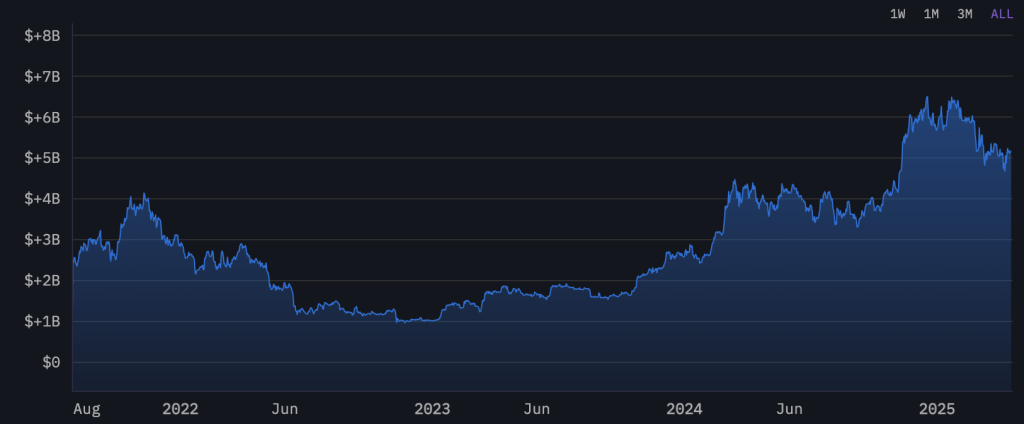So far in 2025, Bitcoin has been struggling to find positive narratives to boost buying pressure and drive up prices. That might be about to change.
Donald Trump’s announcement that his administration was creating a strategic Bitcoin reserve was widely seen as a disappointment in crypto circles. The president’s confirmation that the U.S. would not purchase any new BTC for this stockpile diminished bullish momentum — especially against a backdrop of calls for Uncle Sam to snap up one million coins over the next five years.
But Binance founder Changpeng “CZ” Zhao made a compelling point during last year’s Bitcoin Middle East and North Africa conference — one that’s perhaps been overlooked by many traders: other countries will follow suit.
Lo and behold, we are now beginning to see signs of this happening. Binance’s new chief executive Richard Teng has told the Financial Times that it’s now advising several nations on how they can create a strategic Bitcoin reserve of their own. Make no mistake: this is a bullish development.
Details in that interview were pretty thin on the ground, with Teng revealing the exchange has been contacted by “quite a lot” of governments — including those currently trying to establish a regulatory framework for crypto.
Binance isn’t exactly the flavor of the month in many major economies, with the trading platform facing investigations in some and outright bans in others. And because of this, it’s safe to assume that other countries may be examining BTC stockpiles independently… or through alternative crypto experts.
Indeed, there have already been rumblings elsewhere. Just a few days ago, an MP asked Sweden’s finance minister why this government is adopting a similar approach — and regarding Bitcoin seized from criminals as an investment.
Over in Germany, there was an outcry after 50,000 BTC was auctioned off by Berlin, with the country losing out on billions of dollars as a result. Former finance minister Christian Lindner even asked:
“What kind of negligence is this, and what opportunities are we missing?”
None of this is to say that every country that holds seized Bitcoin is going to hurriedly establish a reserve. Far from it. The British government is a substantial holder of crypto — with Arkham Intelligence data showing it owns over 61,000 BTC worth a cool $5.2 billion.
Ministers in London have explicitly ruled out establishing a Bitcoin reserve, arguing that this asset is too volatile. Yet at the same time, it hasn’t resorted to auctioning off these coins to free up cash for the Treasury — even though the chancellor, finance minister Rachel Reeves, has had to introduce a plethora of unpopular policies to plug a “fiscal black hole” left by her predecessors.
This puts the U.K. in a bit of an awkward halfway house. It isn’t selling this Bitcoin, nor publicly committing to holding onto it. Confirmation of either of these scenarios has the potential to hugely alter BTC’s price — one way or another.
But the creation of strategic crypto reserves could prove most significant in countries that don’t own a single satoshi. Should a central bank decide to shift some of its holdings into Bitcoin — but not have the benefit of already having a warchest confiscated from criminals — they wouldn’t have a choice but to buy.
Even rumours of a country being prepared to make this plunge could see BTC shoot higher — and fuel hopes that the world’s biggest digital asset is finally being regarded as sound money in corridors of power.
There is one potential fly in the ointment: America doesn’t hold anywhere near as much influence as it did when Donald Trump took power on January 20.
Investors are now racing to dump their exposure to dollars and stocks on Wall Street — with the president’s pursuit of tariffs causing the U.S. to widely be regarded as an unreliable trading partner.
In any case, the European Union has made it clear that it has no desire to follow in America’s footsteps. At a recent news conference after the ECB confirmed that interest rates will be cut for the third time this year, Christine Lagarde stressed that the trading bloc sees its future in the digital euro — and not Bitcoin.
And as I’ve mentioned in past pieces, there are some Bitcoiners who remain deeply uncomfortable at the prospect of governments snapping up BTC in the first place.
The post Why Bitcoin Might Be About to Turn Bullish Again appeared first on Cryptonews.
https://cryptonews.com/exclusives/why-bitcoin-might-be-about-to-turn-bullish-again/


